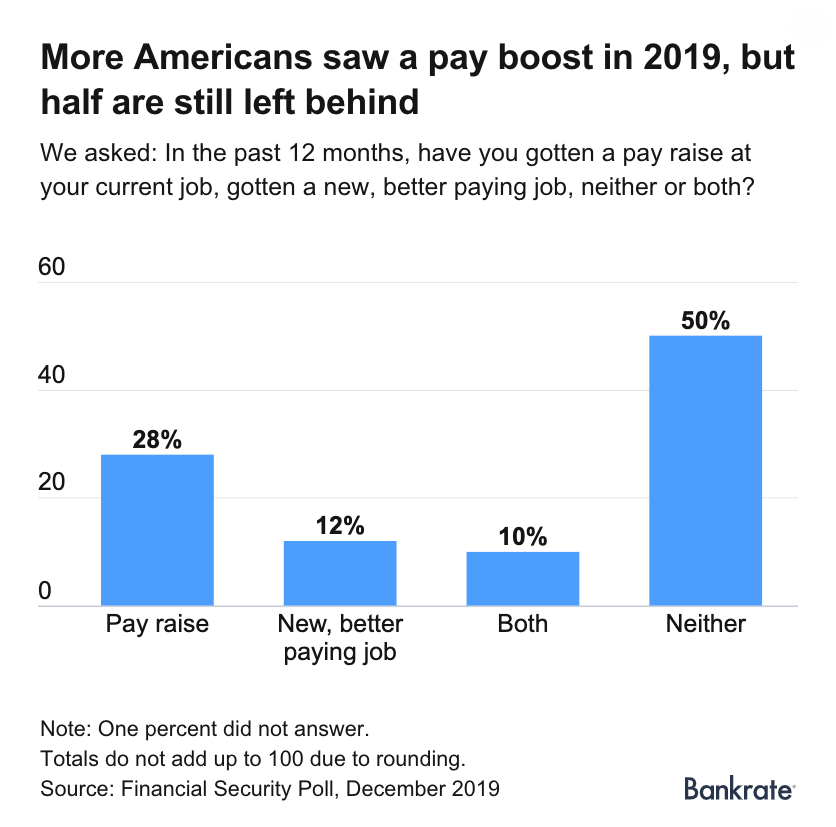1 in 2 workers got a pay increase this year, survey says
More American workers got a higher paycheck this year – either through a raise or job change – thanks to persistently low unemployment.
Nearly half of Americans saw their pay increase in 2019, compared with 38% of workers last year, according to a new survey by Bankrate, which polled 1,000 people by telephone from Nov. 25 to Dec. 1.
Almost 3 in 10 received a raise at their current jobs, while 12% got a wage or salary boost by moving to a new job, double the level from last year. One in 10 workers got higher paychecks from both a new job and a raise.

“It’s a reflection of a tight labor market where there are 1.4 million open and unfilled jobs for workers with specific skills or vocations,” said Greg McBride, chief financial analyst at Bankrate. “They have some negotiating power.”
Who didn’t get a raise?
Since Bankrate’s survey on pay began in 2016, men always have been more likely to get a pay increase. But the gap between the two genders widened this year.
Men were 5% more likely to have received some kind of raise in 2019 versus women. In previous years, men were 1% to 3% more likely to see higher earnings.
Lower-income workers also didn’t benefit from the tight job market as much as their higher-earning counterparts. Of those earning $50,000 or more, 55% saw a pay increase. But almost two-thirds of those with incomes under $30,000 saw no positive change in their pay this year.

“A lot of the jobs that are in the most demand are higher-paying jobs,” McBride said. “In areas where workers are in demand, they can command a higher rate of pay.”
Still, low-earners did better than in 2018, when only 1 in 4 got an increase.
Looking for a new job
Despite the favorable job conditions, only a quarter of workers plan to look for a job in the next year, a similar level as in 2018.
“In a labor market like this, you would expect to see more people looking to capitalize on that by looking for a new job,” McBride said. “We haven't seen that.”
The lowest-earning workers and millennials are the most likely to look for a new job in the next year, Bankrate found. These groups also were among those who were the least likely to have received a raise in the last 12 months.
How to get higher pay in 2020
If you plan to stay put in your current job, there are still ways to get increase your pay, experts said.
Show your value: Think in numbers. How much money did you save or make for the business? How many subscribers did you add? Or how many customers did you reach?
“Track your accomplishments outside of your regular job duties on a daily, monthly, or quarterly basis,” said Joyel Crawford, CEO of Crawford Leadership Strategies. “This way, you’re not scrambling looking for data because you already have it.”

With your numbers in hand, research the salary range for your experience and the type of employer to help support your request for a pay increase.
How to ask for it: Set a positive tone for the conversation with your manager. Know what will make him ro her relate to your cause.
“Most people have been negotiating by asking for more,” said Olivia Jaras, founder of Salary Coaching for Women. “That’s the fastest way to polarize and antagonize whoever's in this conversation with you.”
Instead, partner with them, Jaras said. Explain that you’ve lost track of your market value, but want to figure out how you and your employer can get you up to a certain compensation level.
Start with why, not what: Focus on why you need a raise and how it’s going to help your performance, rather than a specific number.
“It’s not just about the money,” Crawford said. “Would this increase help you get a certification to develop your career? Would it allow you to focus more on driving the success of the business versus worrying about bills being paid?”
If you can propose solutions or projects that you can bring to the table after a pay raise, share it, Crawford said. Show your employer what their return on investment will be.
Denitsa is a writer for Yahoo Finance. Follow her on Twitter @denitsa_tsekova.
Read more:
The best places to work 2020 and what the companies have in common
How politics will make office life and job-hunting harder next year
Follow Yahoo Finance on Twitter, Facebook, Instagram, Flipboard, SmartNews, LinkedIn, YouTube, and Reddit.

 money
money 
